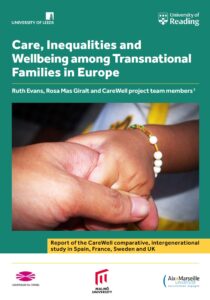Care Inequalities and Wellbeing in Transnational Families in Europe
A new report brings to light the unique and often overlooked challenges faced by families living across national borders.
 As transnational families grow in number due to migration, they face restrictive immigration policies, language barriers and limitations on their social rights. These jeopardise their ability to provide care, both for family members they live with, and for kin living in other countries.
As transnational families grow in number due to migration, they face restrictive immigration policies, language barriers and limitations on their social rights. These jeopardise their ability to provide care, both for family members they live with, and for kin living in other countries.
This report marks an important milestone for the Transnational Families in Europe research project, led by Ruth Evans, Professor of Human Geography, University of Reading and Rosa Mas Giralt, Visiting Researcher, School of Geography, University of Leeds.
Drawing on in-depth interviews and case studies from 122 transnational families in the UK, France, Spain, and Sweden, the report examines the difficulties families face in meeting care needs and the impact of caregiving on the wellbeing of family members. It also urges policymakers to recognise these challenges and provide more inclusive and supportive frameworks, empowering families to thrive across borders.
Caring in a transnational world
As more people migrate or are displaced due to conflict or socio-political instability, families become separated across borders. While family members try to continue to care for each other, policy barriers, financial costs and existing social inequalities undermine their ability to access social care, health, education and other services.
While caring for a family member may foster resilience, it can also have significant negative impacts on education and/or employment opportunities, finances, family relationships, social participation, health and wellbeing.
Digital connections and access to services
Digital tools have become indispensable for transnational families to access essential healthcare, social services and education. However, these platforms often require digital literacy that may be lacking among older family members or those with limited language skills.
Younger family members, more proficient in digital technology, frequently assume roles as ‘digital brokers’, handling online forms and appointments on behalf of their parents and grandparents. This responsibility can be difficult for younger family members and raises ethical concerns around privacy and confidentiality.
The pressures of language brokering and inconsistent ESOL access
The report further emphasises the pressure placed on young people to act as interpreters, or ‘language brokers’, for their parents or other relatives, especially in healthcare settings. Children and teenagers may be required to interpret medical information or fill out forms, a task that can be stressful and ethically complex.
This issue is exacerbated by inconsistent access to English for Speakers of Other Languages (ESOL) classes for adults. The report finds that limited funding, travel costs, and childcare needs prevent many adult family members from accessing ESOL courses, which could reduce their reliance on their children in navigating language barriers.
Restrictive family reunion visas and their impact on care
The report also underscores how family reunion immigration restrictions pose a major obstacle to transnational families in need of in-person support. Stringent eligibility requirements and prolonged waiting times prevent many families from reuniting, even in cases where close family members require care.
These restrictions jeopardise the wellbeing of families, complicate caregiving responsibilities and place additional strain on the remaining members. The study suggests that reducing these restrictions could have a positive impact on the health and wellbeing of transnational families.
Policy recommendations for a transnational world
Based on these findings, the report calls for targeted policy interventions to support transnational families more effectively.
For example, the report recommends that the UK government invest in expanded, long-term funding for ESOL classes and reduce the cost and complexity of applying for family reunion visas, including fast-tracking where there are care needs.
Additionally, there is a call to provide more inclusive support in accessing public services and address the digital divide to support those who find it difficult to navigate digital platforms for healthcare and other essential services.
Policymakers are urged to recognise and alleviate the responsibilities placed on young people who act as informal interpreters for their families. Expanding access to qualified translators and interpreters, and improving digital infrastructure and alternative means of accessing services would alleviate young people’s caring roles and ensure safer, more inclusive services for migrants.
Launch events in Reading, Leeds and Manchester
The report will be formally launched at three public events for community members, policymakers, and partner organisations (including Reading Community Learning Centre and Refugee Support Group, St Vincent’s Centre in Leeds, Migrant Support in Manchester, and the Migrant English Support Hub), to engage with the research and explore practical solutions.
The launch events will include screening of short films highlighting key findings and recommendations, co-produced by the research team and transnational family members, practitioners and partner organisations.
Events will take place on 5 November in Reading, on 15 November in Leeds and on 29 November 2024 in Manchester. Further details can be found on the project’s official website.
Download the summary and full report: Evans, R., Mas Giralt, R. et al. (2024) Care, inequalities and wellbeing among transnational families in Europe. Report. University of Reading and University of Leeds, UK. DOI: https://doi.org/10.48683/1926.00119301.
